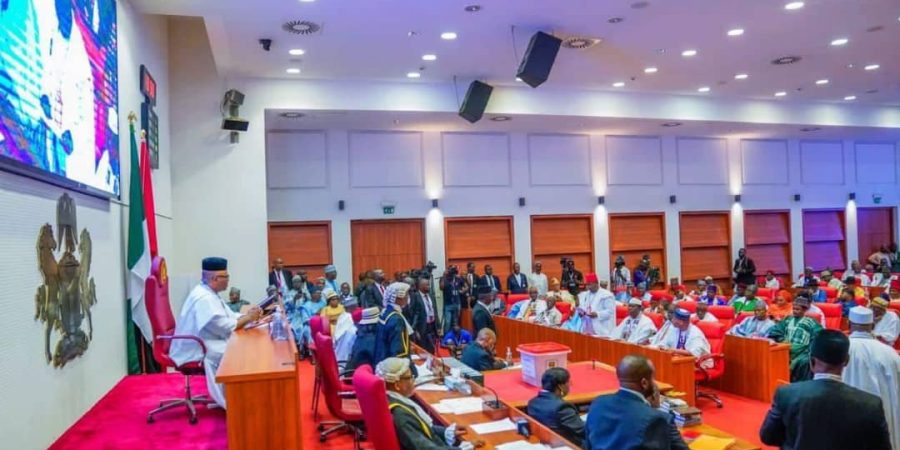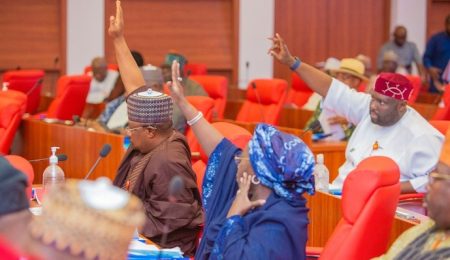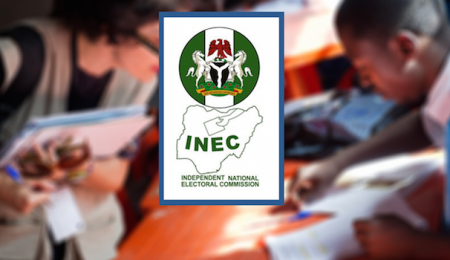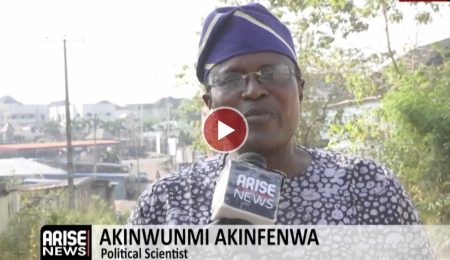In what could mark a turning point for Nigeria’s ailing electricity sector, the Senate on Wednesday, debated the general principles of the Electricity Act (Amendment) Bill, 2025.
It was a sweeping legislative initiative aimed at rescuing the power industry from systemic collapse.
This comes as the Senate on Wednesday also launched a full-scale investigation into the operations of Ponzi schemes in the country.
The development followed the catastrophic collapse of the Crypto Bullion Exchange (CBEX), a digital investment platform that allegedly defrauded Nigerians of over N1.3 trillion ($847 million), making it one of the most devastating financial scams in the nation’s history.
The bill to debate the general principles of the Electricity Act (Amendment) Bill, 2025, was sponsored by Senator Enyinnaya Abaribe (Abia South), proposes 28 substantial amendments to the Electricity Act, 2023, in a bid to untangle the deep-rooted legal, operational, and financial challenges afflicting the Nigerian Electricity Supply Industry (NESI).
Abaribe, who led the debate during plenary, delivered a stark warning: Nigeria’s power sector is teetering dangerously on the brink, burdened by trillions of naira in unpaid debts, a fragmented regulatory environment, and rampant infrastructure vandalism.
“The Nigerian power sector is hanging on a cliff and requires immediate and drastic action to rescue it from total collapse,” Abaribe declared.
The proposed amendment bill draws heavily from the findings of a comprehensive diagnostic review carried out by the Senate Committee on Power.
The committee, in its report, painted a grim picture of a sector in turmoil, unable to deliver on its mandate despite successive waves of reform.
At the heart of the bill are measures designed to bring clarity, accountability, and stability to a sector long mired in controversy and inefficiency.
It seeks to strengthen coordination between the federal and state governments in regulating electricity in the aftermath of the constitutional amendment that moved power matters to the concurrent legislative list.
The amendment also introduces stricter penalties for the vandalism of electricity infrastructure, and establishes a clearer transitional framework between the Nigerian Electricity Regulatory Commission (NERC) and state-level regulators.
It also creates legal backing for host community engagement in electricity projects.
Additionally, it provides a foundation for implementing targeted subsidies through the Power Consumer Assistance Fund, aimed at protecting low-income consumers from the burden of rising electricity costs.
Abaribe emphasised that the bill does not seek to place any new financial burden on the federal government.
Rather, it aims to eliminate ambiguities in the existing law, enhance regulatory oversight, and introduce legal tools to combat sabotage and poor governance in the sector.
“This amendment is not about more spending—it’s about smarter laws and enforcement,” he said.
The Senate floor saw resounding support for the bill, with lawmakers from both sides of the aisle describing it as “bold,” “timely,” and “transformative.”
Senator Muhammad Tahir Monguno (Borno North) likened the bill to the groundbreaking Petroleum Industry Act (PIA).
He said it has the potential to revolutionise the power sector in much the same way the PIA reshaped Nigeria’s oil and gas industry.
He recounted how prolonged vandalism had left entire communities in his constituency without electricity for over six months, expressing hope that the bill’s punitive provisions would finally serve as a deterrent.
In his contribution, Senator Lola Ashiru (Kwara South), Vice Chairman of the Senate Committee on Power, said the amendment was a necessary evolution in the country’s reform journey.
He warned that unless the growing debts owed to generation, transmission, and distribution companies were urgently addressed, the sector could face irreversible damage.
However, Senator Muhammad Adamu Aliero, took a more hardline stance, advocating capital punishment for repeat offenders involved in the destruction of power infrastructure.
He also lamented the continuing financial burden on the federal government despite the privatisation of the power sector, calling it a “privatisation without results.”
Senator Solomon Olamilekan Adeola (Ogun West), Chairman of the Senate Committee on Appropriations, raised the alarm over insufficient budgetary provisions to key agencies like the Nigerian Bulk Electricity Trading Plc (NBET).
He said the situation was fuelling defaults and even contractor-led sabotage.
He said budget allocations to MBET are grossly inadequate, making it difficult for the agency to meet its contractual obligations to power generation companies — ultimately cascading down to consumers through inefficient service delivery.
In a particularly candid contribution, Senator Garba Maidoki (Kebbi South) criticised the conduct of distribution companies (DISCOs).
He accused them of consistently ignoring Senate resolutions while overcharging consumers and defaulting on payments to gas suppliers such as the NNPC.
“Even as a Senator, I struggle to pay my electricity bills,” Maidoki revealed.
His declaration, however, prompted murmurs across the chamber.
He called for a complete restructuring of the electricity tariff model, which he said disproportionately penalises consumers for failures beyond their control.
Other lawmakers, including Senator Buhari Abdulfatai (Oyo North) and Senator Sahabi Yaú (Zamfara North), echoed calls for tougher penalties against vandals.
They also decried the ongoing practice where DISCOs claim ownership of electricity transformers purchased by local communities through communal efforts or public funds.
As the debate concluded, the consensus within the Red Chamber was clear: The Electricity Act (Amendment) Bill, 2025, offers a rare opportunity to realign Nigeria’s power sector with the goals of transparency, sustainability, and universal access.
The bill has now been referred to the Senate Committee on Power for further legislative work and is expected to return for clause-by-clause consideration in the coming weeks.
If passed, it could usher in a new era of reform and finally offer Nigerians the stable electricity supply that has long eluded them.
Senate Orders Full Probe into N1.3trn CBEX Ponzi Scandal
Meanwhile, the Senate on Wednesday launched a full-scale investigation into the operations of Ponzi schemes in the country.
The development followed the catastrophic collapse of the Crypto Bullion Exchange (CBEX), a digital investment platform that allegedly defrauded Nigerians of over N1.3 trillion ($847 million), making it one of the most devastating financial scams in the nation’s history.
The motion, sponsored by Senators Mukhail Adetokunbo Abiru (Lagos East) and Osita Izunaso (Imo West), received overwhelming support from lawmakers during the debate at plenary.
The federal lawmakers unanimously described the proliferation of such schemes as a direct threat to national security, economic stability, and public trust in government institutions.
Rising in support of the motion, senators from across the country decried the systemic regulatory failure that allowed CBEX and similar fraudulent platforms to operate unchecked.
They lamented that the fraudulent operators leveraged technology, social media influence, fake testimonials, and referral commissions to lure millions into financial ruin.
Presenting the lead debate, Senator Abiru, detailed how CBEX capitalised on weak oversight by the Central Bank of Nigeria (CBN), the Securities and Exchange Commission (SEC), the Nigerian Financial Intelligence Unit (NFIU), and the Economic and Financial Crimes Commission (EFCC) to fleece unsuspecting investors.
He warned that beyond financial losses, such platforms were fueling depression, suicides, and the erosion of public confidence in legitimate financial institutions.
“Over N1.3 trillion was lost to CBEX alone. This is not an isolated incident. It is a continuation of a troubling pattern, from MMM in 2016 to MBA Forex in 2020. Nigerians are being robbed, again and again,” Abiru said.
In his contribution, Senator Tahir Monguno (Borno North) called the situation “alarming” and stressed that existing laws must not only be amended but “strengthened” to prevent further exploitation.
He said, “These operators prey on vulnerable and gullible citizens. Some victims have died by suicide. It is time we acted decisively.”
Also, Senator Sadiq Suleiman Umar (Kwara North) emphasised the trust Nigerians place in their government and urged agencies to live up to their mandate.
“People trust that the government will protect them. We must ensure that SEC, CBN, EFCC, and others never allow such lapses again,” Umar said.
However, Senator Solomon Adeola (Ogun West), lamented the regulatory gap in Nigeria’s rapidly evolving fintech space.
He warned that many digital platforms operate under the radar.
He said, “It’s not just Ponzi schemes. There are several other unregulated online payment platforms riding on fintech buzzwords. CBN must tell us what rules are in place.”
Senators Abdul Ningi (Bauchi Central) and others urged the National Assembly to utilize its constitutional powers under Sections 88 and 14 of the 1999 Constitution (as amended) to hold regulatory agencies accountable.
“These laws exist, but for too long we’ve failed to enforce them. The people are suffering,” Ningi declared.
Senate President Godswill Akpabio recounted a personal experience from the early 1990s involving a now-defunct Ponzi scheme in Port Harcourt, drawing parallels with today’s CBEX.
Akpabio said, “That scheme collapsed. People lost everything. History is repeating itself, only now on a bigger scale— N1.3 trillion gone. Students, civil servants, even pensioners were affected. This is an emergency.”
He backed calls for nationwide public sensitisation and zonal public hearings.
The Senate President said, “We must educate our people. Many of these victims are not literate in financial matters. If it doesn’t concern you directly, it will affect someone close to you.”
In its resolution, the Senate mandated a joint investigation by the Committees on Capital Market; Banking, Insurance and Other Financial Institutions; Anti-Corruption and Financial Crimes; and ICT & Cybersecurity.
The committees, to be led by that of Banking and Finance committee, are expected to conduct a comprehensive investigative hearing, including public sessions, and submit their report within four weeks.
The inquiry, according to Akpabio, will focus not only on CBEX but also on the broader Ponzi ecosystem, regulatory lapses, and proposals for legislative and administrative reforms.
The Senate also called for immediate steps to educate the public, especially youth and rural populations, on the dangers of fraudulent investment schemes.
As the motion passed unopposed, Senator Akpabio declared: “We cannot sit back while Nigerians are being robbed blind.
“We must act to prevent more suicides, restore trust, and reclaim our economy from digital predators,” he declared.
Sunday Aborisade
Follow us on:



